

Confronting the Challenges of a Participatory Culture: Media Education in the 21st Century.
Resilience: The Other 21st Century Skills. Due to the interest of my post The Other 21st Skills, I decided to individually discuss each of the skills or dispositions I proposed that are in addition to the seven survival skills as identified by Tony Wagner.
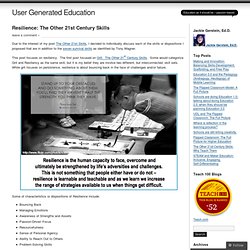
This post focuses on resiliency. The first post focused on Grit: The Other 21st Century Skills. Some would categorize Grit and Resiliency as the same skill, but it is my belief they are involve two different, but interconnected, skill sets. While grit focuses on persistence, resilience is about bouncing back in the face of challenges and/or failure. Some of characteristics or dispositions of Resilience include: Bouncing BackManaging EmotionsAwareness of Strengths and AssetsPassion-Driven FocusResourcefulnessSense of Personal AgencyAbility to Reach Out to OthersProblem-Solving Skills.
Developing Character, Courage & College Readiness. Leaders often cut their own path.
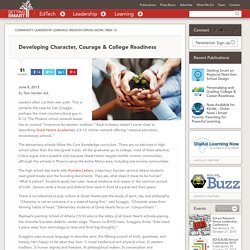
That is certainly the case for Dan Scoggin, perhaps the most countercultural guy in K-12. The Phoenix school network leader has an unusual “reverence for western tradition.” Back-to-basics doesn’t come close to describing Great Hearts Academies, a K-12 charter network offering “classical education, revolutionary schools.” The elementary schools follow the Core Knowledge curriculum. There are no electives in high school (other than the latin/greek track). The high school day starts with Humane Letters, a two-hour Socratic seminar where students read great books and the founding documents. There is no reference to pop culture at Great Hearts–just the study of spirit, law, and philosophy.
Raphael’s painting School of Athens (1510) adorns the lobby of all Great Hearts schools–placing the Aristotle-Socrates dialectic center stage. Scoggins uses unusual language to describe aims: the lifelong pursuit of truth, goodness, and beauty. Kern Convening.
How Children Succeed. Well Being. Social Emotional Learning. Back to School. Ira talks with Paul Tough, author of the new book How Children Succeed, about the traditional ways we measure ability and intelligence in American schools.
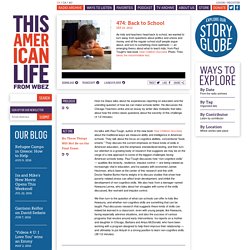
They talk about the focus on cognitive abilities, conventional "book smarts. " They discuss the current emphasis on these kinds of skills in American education, and the emphasis standardized testing, and then turn our attention to a growing body of research that suggests we may be on the verge of a new approach to some of the biggest challenges facing American schools today. Paul Tough discusses how “non-cognitive skills” — qualities like tenacity, resilience, impulse control — are being viewed as increasingly vital in education, and Ira speaks with economist James Heckman, who’s been at the center of this research and this shift.
Doctor Nadine Burke Harris weighs in to discuss studies that show how poverty-related stress can affect brain development, and inhibit the development of non-cognitive skills. How Children Succeed: Attachment, Advisory & Adversity. Paul Tough takes on the enormous question of How Children Succeed in his new book.
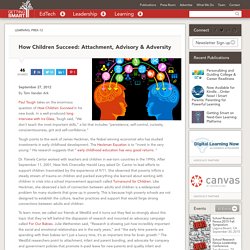
In a well-produced long interview with Ira Glass, Tough said, “We don’t teach the most important skills,” a list that includes “persistence, self-control, curiosity, conscientiousness, grit and self-confidence.” Tough points to the work of James Heckman, the Nobel winning economist who has studied investments in early childhood development. The Heckman Equation is to “invest in the very young.” His research suggests that ” early childhood education has very good returns .” Dr. To learn more, we called our friends at WestEd and it turns out they feel so strongly about this topic that they’ve left behind the dispassion of research and mounted an advocacy campaign called For Our Babies. Sustained relationships.
At the secondary level, the shuffle of a discipline-based master schedule can lead to a lack of sustained relationships and more opportunities for students to fall through the cracks. Adversity. Transcript. Ira Glass Act One-- No, These Things Will Not Be on the Final Exam.
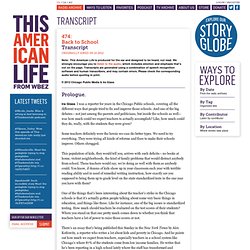
OK, so let's start with the most basic question, a question that is so big, it is almost embarrassing to ask out loud. What should kids be learning at school? You know, people argue about this. How Children Succeed: Grit, Curiosity, and the Hidden Power of Character: Paul Tough: 9780547564654: Amazon.com. Curriculum & Competency Models. Cross Curricular Competencies. Information and Communications Technology Integration - ICTI. Overview The Information and Communications Technology Integration Performance Standards, Grades 5 to 10 (ICTI), are intended to support teachers and students as they use technology to enhance learning across the curriculum.
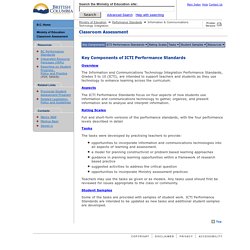
Aspects The ICTI Performance Standards focus on four aspects of how students use information and communications technology to gather, organize, and present information and to analyse and interpret information. Rating Scales Full and short-form versions of the performance standards, with the four performance levels described in detail Tasks The tasks were developed by practising teachers to provide: Teachers may use the tasks as given or as models. Student Samples Some of the tasks are provided with samples of student work. Social Responsibility-BC Performance Standards. Competency Model Clearinghouse - Industry Competency Models.